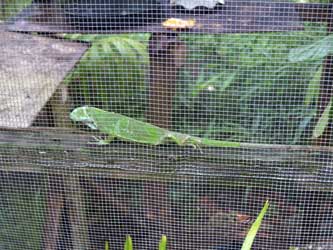 Zoo Keepers are primarily responsible for the day-to-day husbandry of animals in their care. This career is ideal for anyone who wants to work closely with animals and be responsible for meeting their physical and psychological needs.
Zoo Keepers are primarily responsible for the day-to-day husbandry of animals in their care. This career is ideal for anyone who wants to work closely with animals and be responsible for meeting their physical and psychological needs.
Zoo Keepers have the opportunity to specialise their skills for working with a range of animals including large mammals such as giraffes and the big cats to reptiles, aquatic animals, birds and small mammals.
Zoo Keepers not only provide animals with their daily needs of food, shelter and stimulation, but they are also responsible for monitoring the health and well being of these animals. Zoo Keepers are in the unique position of being able to regularly observe the behaviour of animals in the care and they are often required to carry out monitoring and follow-up care if required.
This is a very rewarding career for those with a passion for exotic animals. It can also take you to anywhere in the world working in zoos, sanctuaries and safari parks.
Below are some courses to help start on your career towards becoming a zoo keeper:
Zookeeper Profile
The priority of a zoo keeper is to maintain the health and welfare of the animals in their care. This includes ensuring the animals are well fed and have everything they need to be comfortable. Zoo keepers are also expected to clean out animal enclosures daily.
Another role of zoo keepers is to educate the visitors as keepers will often be the first point of contact. They may even have to give presentations or demonstrations to the public or help with conservation and research projects.
Opportunities
This job provides the opportunity to work with a wide range of animals anywhere in the world. There are also wildlife reserves, aquariums and animal centres.
Risks and Challenges
Working with wild animals carries an element of risk and it is very important to always adhere to the zoos health and safety guidelines. Challenges include offering the animals a stimulating environment and being able to run successful breeding programmes to help with the conservation of the species.
How to become a zookeeper
A career in a zoo environment can be very competitive, so you need to have a lot of experience.
Sometimes the best start is voluntary work experience at "any" animal organisations whether a kennel, animal rescue centres, an animal sanctuary or alike. Many zoos and wildlife parks have "friends" or other programs, that offer opportunities for volunteers to become involved. Volunteer work looks very good on your CV – giving you experience but also showing that you are dedicated to working with animals. There are also a variety of animal care qualifications that you can take which will improve your chances.
Some people kick off a career by studying a relevant courses (such as our zoo keeping or animal health courses). Others commence with higher level courses such as certificates, diplomas or degrees.
Qualifications alone are no guarantee though in this industry. Some people who do university degrees struggle to ever get a zoo job, but others with much lower qualifications may sometimes find opportunities emerge that the degree graduates are not offered.
Getting started in this industry depends upon being prepared to move to where the work is; and anso recognising that you need to develop your experience as well as knowledge. Studying something is a big help, but employers look at your attitude, personality, knowledge and experience -it is a competitive business, but one with lots of opportunity if you are motivated and prepare for a career in a holistic way.